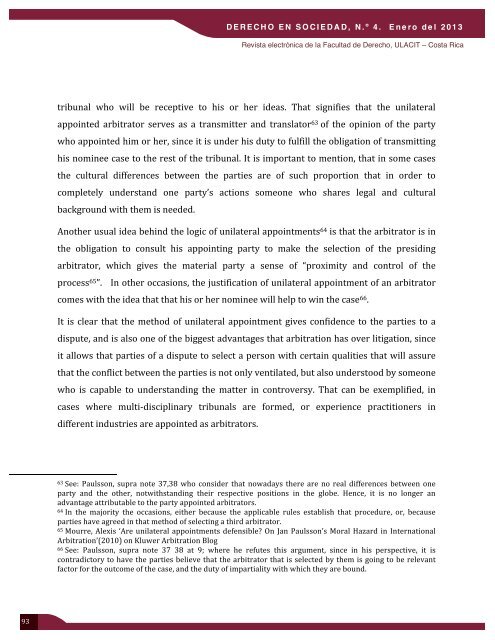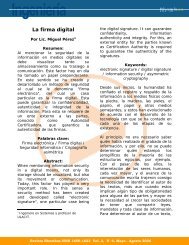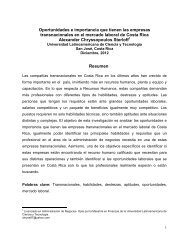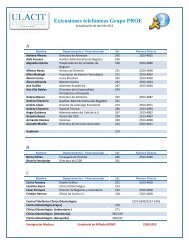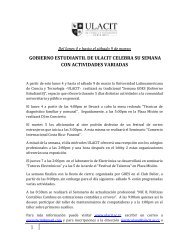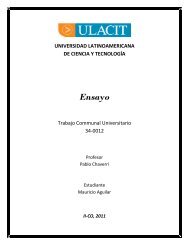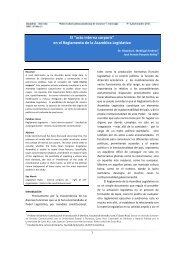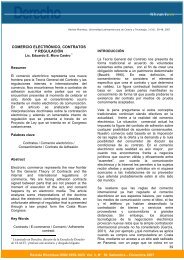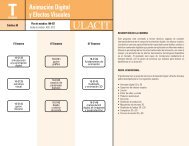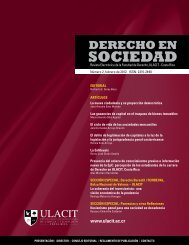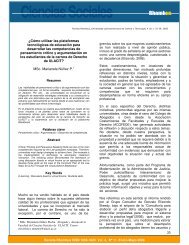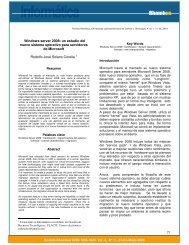IV Edición Revista Derecho en Sociedad - Ulacit
IV Edición Revista Derecho en Sociedad - Ulacit
IV Edición Revista Derecho en Sociedad - Ulacit
Create successful ePaper yourself
Turn your PDF publications into a flip-book with our unique Google optimized e-Paper software.
DERECHO EN SOCIEDAD, N. º 4 . Enero del 2013<br />
<strong>Revista</strong> electrónica de la Facultad de <strong>Derecho</strong>, ULACIT – Costa Rica<br />
tribunal who will be receptive to his or her ideas. That signifies that the unilateral <br />
appointed arbitrator serves as a transmitter and translator 63 of the opinion of the party <br />
who appointed him or her, since it is under his duty to fulfill the obligation of transmitting <br />
his nominee case to the rest of the tribunal. It is important to m<strong>en</strong>tion, that in some cases <br />
the cultural differ<strong>en</strong>ces betwe<strong>en</strong> the parties are of such proportion that in order to <br />
completely understand one party’s actions someone who shares legal and cultural <br />
background with them is needed. <br />
Another usual idea behind the logic of unilateral appointm<strong>en</strong>ts 64 is that the arbitrator is in <br />
the obligation to consult his appointing party to make the selection of the presiding <br />
arbitrator, which gives the material party a s<strong>en</strong>se of “proximity and control of the <br />
process 65 ”. In other occasions, the justification of unilateral appointm<strong>en</strong>t of an arbitrator <br />
comes with the idea that that his or her nominee will help to win the case 66 . <br />
It is clear that the method of unilateral appointm<strong>en</strong>t gives confid<strong>en</strong>ce to the parties to a <br />
dispute, and is also one of the biggest advantages that arbitration has over litigation, since <br />
it allows that parties of a dispute to select a person with certain qualities that will assure <br />
that the conflict betwe<strong>en</strong> the parties is not only v<strong>en</strong>tilated, but also understood by someone <br />
who is capable to understanding the matter in controversy. That can be exemplified, in <br />
cases where multi-‐disciplinary tribunals are formed, or experi<strong>en</strong>ce practitioners in <br />
differ<strong>en</strong>t industries are appointed as arbitrators. <br />
63 See: Paulsson, supra note 37,38 who consider that nowadays there are no real differ<strong>en</strong>ces betwe<strong>en</strong> one <br />
party and the other, notwithstanding their respective positions in the globe. H<strong>en</strong>ce, it is no longer an <br />
advantage attributable to the party appointed arbitrators. <br />
64 In the majority the occasions, either because the applicable rules establish that procedure, or, because <br />
parties have agreed in that method of selecting a third arbitrator. <br />
65 Mourre, Alexis ‘Are unilateral appointm<strong>en</strong>ts def<strong>en</strong>sible? On Jan Paulsson’s Moral Hazard in International <br />
Arbitration’(2010) on Kluwer Arbitration Blog <br />
66 See: Paulsson, supra note 37 38 at 9; where he refutes this argum<strong>en</strong>t, since in his perspective, it is <br />
contradictory to have the parties believe that the arbitrator that is selected by them is going to be relevant <br />
factor for the outcome of the case, and the duty of impartiality with which they are bound. <br />
93


